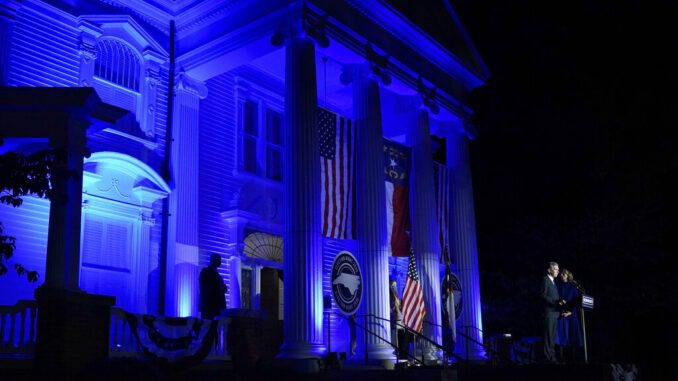
RALEIGH — Historic levels of money poured into North Carolina elections this cycle, including money from a number of 501(c)4s, also known as “dark money” groups. But what results did that money buy? Based on the results, the answer seems to be Republican wins.
501(c)4s are called dark money groups because they are not required to disclose their donors.
Democrats spent millions in state races this year that failed to translate into Democrat wins, especially at the state legislature. While Republicans did not recapture their veto-proof majorities in either chamber, they did maintain their majorities.
The previous Republican majority was 65-55 in the House, and this cycle Republicans picked up four seats bringing their total to 69 of out of 120 seats. Democrats suffered a net loss of four seats, dropping their number of seats to 51. Democratic incumbents had a rough time, with House Reps. Sydney Batch (D-Wake), Scott Brewer (D-Stanly), Christy Clark (D-Mecklenburg), Ray Russell (D-Watauga) and Joe Sam Queen (D-Haywood) all losing their seats.
In the Senate, the ratio had been 29-21 in favor of Republicans. Democrats only picked up a single seat, bringing their total to 22 out of the 50 total members.
The NC Dem Leadership Committee (NCDLC) was one of the bigger spenders, particularly on Council of State races. NCDLC had a beginning balance this cycle of over $8.9 million and a third-quarter ending balance of $2,145,001.
Notable contributions include Adam Stein, the father of Attorney General Josh Stein, who made a total of $75,000 in contributions to NCDLC. Josh Stein received $2.9 million in campaign contributions from NCDLC.
Democratic lieutenant governor candidate Rep. Yvonne Holley’s campaign received a total of $450,000 from NCDLC; Gov. Roy Cooper’s campaign was the recipient of $9.75 million. Holley lost to Republican Mark Robinson by over 3% of the vote; whereas, Cooper won a second term against Lt. Gov. Dan Forest.
At this time, it is unclear how much was spent by the group Moving NC Forward, which in the past fundraised for Cooper and Stein.
Moving NC Forward was started by Tom Hendrickson, a businessman and long-time donor to Cooper. Hendrickson was appointed to several state boards by the Cooper administration when Hendrickson’s daughter Katie worked for Cooper in a role recommending boards and commissions appointments. Records from 2019 on file with the N.C. Secretary of state show Moving NC Forward brought in close to $1 million. The group received grants from businesses totaling $897,000.
Forward Majority Action was another Dark Money player in the state, albeit as more of a passthrough for multiple other groups. Forward Majority Action made payments to two groups, Make North Carolina First for $100,000 and North Carolina Families First for $250,000.
Make North Carolina First is a 501(c)4 created by Raleigh-area attorney Michael Weisel. The most recent filings show Public Policy Polling founder Dean Debnam sits on the board of the organization.
NC Families First, another group formed by Weisel, sent money ($201,975) on to at least three other Dark Money groups. Real Facts NC received $100,000 and Way to Lead NC PAC got $17,700.
A third group, Education Now, received $84,275. Education Now a is a 501(c)4 run by former legislator and member of the Senate Democratic Leadership team, Linda Garrou. In January of this year, the group’s pitch for a plan to spend $1 million to $2 million each on Senate districts 1, 7, 11, 13, 24 and 31.
NC Families First’s third quarter filing shows $2 million in receipts and $1,874,538 in expenditures, which all went to negative print media, TV and radio ads. That third quarter filing includes receipts from Make NC First for $1,100,000, Majority Forward Action for $250,000, NC Citizens Protecting our Schools for $500,000, and Progress Action NC for $500,000.
In the state Senate races, NC Families First opposed Republicans Amy Galey and Bob Steinburg. The group spent $603,310 on ads opposing Galey and over $1.1 million on Steinburg. Both Galey and Steinburg won their respective races.
Conversely, the group supported Democrat Allen Wellons in the amount of $603,310. Wellons lost his District 11 race by a 10-point margin to Republican Lisa Barnes.
In the House, NC Families First put over $161,000 into ads opposing Diane Wheatley in District 43, over $603,000 opposing District 1 incumbent Ed Goodwin, and over $603,000 opposing Ray Pickett for the District 93 seat, which covers Ashe and Watauga Counties. All three candidates won.
Wheatley’s win secures the House District 43 seat for Republicans, which had been held by Democrat Elmer Floyd. Floyd was defeated by an 11-point margin in the March Democratic primary by Kimberly Hardy.
Additionally, NC Families First spent $603,310 each opposing four-term incumbent John Szoka (R-Cumberland) and Jeff Zenger in the House 47 race. As with all of the other races, both Szoka and Zenger prevailed over their Democrat opponents. Zenger replaces Republican Wes Schollander, who was appointed to the Forsyth seat in August 2020.
NC Families First only opposed one Council of State member, putting over $603,000 against Mark Robinson, the Republican candidate for lieutenant governor.
Unlike NC Families First, expenditures made by Advance North Carolina (ANC) were all in support of Democratic candidates, including Chief Justice Cheri Beasley and Council of State candidates. Funds spent were on advertising across print media, radio, billboards, door hangers and television ads.
ANC put in just under $236,000 into around 17 promotions backing N.C. Supreme Court Chief Justice Beasley. The chief justice race had been a tight one in the days following the General Election as provisional ballots were counted and additional absentee by-mail ballots continued to trickle in. The absentee ballots were allowed to be accepted through Nov. 12 by 5 p.m. which is six days longer than in past elections. The extension is due to a consent agreement entered into by the state’s board of elections and a plaintiff represented by former Hillary Clinton Campaign attorney Marc Elias.
ANC also put $235,902 behind Holley and Secretary of Labor candidate Jessica Holmes. Neither woman won their race. Much smaller funds in the form of $1,049 for slate cards was spent on other Council of State candidates such as treasurer candidate Ronnie Chatterji, state superintendent candidate Jen Mangrum, and Agriculture commissioner candidate Jenna Wadsworth.
The same money for slate cards was spend for incumbents which included Secretary of State Elaine Marshall, Attorney General Josh Stein and State Auditor Beth Woods. All of the incumbents kept their seats while Chatterji, Mangrum and Wadsworth all lost.
In other judicial races like the Court of Appeals, ANC’s support did not yield any wins. The group spent $235,902 on Rueben Young in his contest against Republican Jeff Carpenter. Young lost. The same amount was put behind Lora Cubbage, who faced Republican Fred Gore. The result was the same and Cubbage lost to Gore.
As with the Council of State, ANC spent $1,049 each on slate cards for Democratic Court of Appeals candidates Chris Brook, Tricia Shields and Gray Styers. All three lost. April Wood defeated Shields, Jefferson Griffin beat Chris Brook and Chris Dillon defeated Styers.
ANC had a win in the North Carolina Senate with Ernestine Bazemore defeating Republican Thomas Hester Jr. for the District Three seat, which covers Beaufort, Bertie, Martin, Northampton, Vance and Warren Counties. The seat is currently held by Democrat Erica Smith, who failed to win the March primary to challenge Republican U.S. Sen. Thom Tillis. Tillis recently won reelection over Democrat Cal Cunningham.
The Bazemore win was a wash for ANC, with Democrat David Sink losing badly to incumbent Sen. Bill Rabon (R-Brunswick), Senate Leader Phil Berger’s top deputy, by over 27 points.
The extent of spending won’t be fully known until the fourth quarter reports are due to the State Board of Elections.



